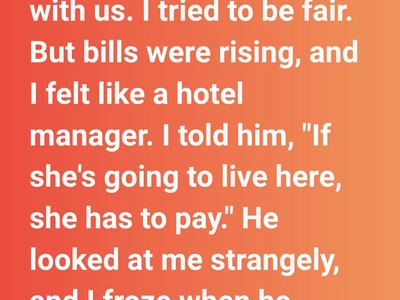A Lesson in Understanding from My Son and His Girlfriend
When my son turned twenty-two, I thought we’d reached that sweet spot where he was old enough to be independent but still close enough to feel like my little boy. So when he told me his girlfriend was moving in, I wanted to handle it with grace. I told myself I’d be fair, open-minded, supportive. I wanted to give them the space to grow, to learn what it means to build a life together — even if that life started under my roof.
At first, it felt manageable. She was polite, helped with dishes, and always greeted me with a smile. I told myself everything was fine, that I could adjust. But as the weeks went by, little things began to wear on me. The water bill climbed higher than usual. Groceries disappeared faster. Lights were left on in rooms no one was using. None of it was catastrophic, but the quiet accumulation of small changes started to feel heavy.
It wasn’t just about the money. It was about the atmosphere. The rhythm of the house had changed. I’d once enjoyed the quiet of the evenings — reading, tidying up, maybe watching a show — but now I heard laughter, footsteps, murmurs behind closed doors. It wasn’t bad noise, but it reminded me constantly that the house wasn’t quite mine anymore.
I began to feel like a guest in my own home, like I was tiptoeing around to give them privacy. I’d catch myself hesitating outside the kitchen, wondering if I was intruding when I wanted a glass of water. I’d open the fridge and see things I didn’t buy — her almond milk, her favorite brand of yogurt, her energy drinks lined neatly beside the leftovers I’d made. They weren’t big things, but they made me feel like the balance had quietly shifted.
One evening, after a long day at work and an even longer evening staring at another inflated electricity bill, I decided I couldn’t keep quiet anymore. My son was sitting in the living room with his girlfriend, watching something on TV. I hesitated in the hallway for a moment, rehearsing what I wanted to say in my head. I didn’t want to sound harsh. I just wanted to be honest.
“Can I talk to you for a second?” I asked, trying to sound calm.
He muted the TV, gave me that wary look kids give when they sense a parent is about to lecture them. His girlfriend immediately stood up, polite as ever, and offered to give us privacy. I told her it was fine, that she didn’t need to go anywhere.
I took a deep breath. “I just think,” I began carefully, “that if she’s going to be living here full-time, she should probably contribute. You know — to groceries, utilities, things like that. It’s only fair.”
There was a moment of silence. My son looked at me with an expression I couldn’t quite read — surprise, maybe confusion, maybe both. Then he said, “Mom…” His voice softened, almost hesitant. “Didn’t she tell you?”
My stomach tightened. The way he said it made me brace myself for bad news. Maybe she’d lost her job. Maybe she was struggling with something personal. My mind leapt through a dozen possibilities in the space of a heartbeat.
“She’s been paying,” he said finally. “For groceries, and for part of the utilities. She just didn’t want to make things awkward, so she gave me the money, and I’ve been covering it with mine when I transfer you my share.”
For a second, I couldn’t find any words. My face flushed, and I felt a sting of guilt sweep through me. I had been so sure I was standing up for fairness, for what was right. But instead, I had misread the situation entirely.
I looked over at her — she was standing near the couch, her hands clasped in front of her, looking almost apologetic. “I didn’t want to make you uncomfortable,” she said softly. “You’ve been so kind letting me stay here. I just wanted to help without it feeling… transactional.”
I nodded slowly, embarrassed by how quickly I had assumed the worst. I muttered something like, “I didn’t realize,” and excused myself before I said anything clumsier.
That night, I couldn’t sleep. I kept replaying the conversation in my head, feeling smaller each time. I’d been so focused on the surface — the bills, the noise, the disruption — that I hadn’t stopped to see what was really happening. She wasn’t taking advantage of us; she was trying to fit in, to be considerate. I had let my worries turn into a silent story of resentment, and I had believed it without checking the facts.
When I went to the kitchen around midnight to get a glass of water, I noticed a folded piece of paper on the counter. It was a small note, written in careful handwriting.
“Thank you for letting me stay here,” it said. “I know it’s an adjustment, and I want to help more if I can. I really appreciate your kindness. I hope you don’t see me as a burden.”
I stood there in the quiet kitchen, the refrigerator humming softly, the note trembling slightly in my hand. My throat tightened. I could almost feel the sincerity in her words. In that moment, every ounce of frustration I’d built up melted into something gentler — guilt, yes, but also tenderness.
Sometimes, the stories we tell ourselves drown out the truth sitting quietly right in front of us.
The next morning, I got up earlier than usual. The house was still, filled with the soft light of sunrise. I decided to make breakfast — pancakes, bacon, fresh coffee. It felt like a small gesture, but one that mattered. When they came into the kitchen, surprised by the smell, I smiled and gestured toward the table.
“I owe you both an apology,” I said simply.
My son looked puzzled, but his girlfriend smiled shyly, understanding before I even finished. I told them how sorry I was for jumping to conclusions, for not asking before assuming. We talked about how everyone was feeling, about what would make things easier for all of us.
It was a good talk — honest, kind, open. By the time we finished breakfast, the heaviness that had been sitting in the air for weeks had lifted. We laughed. We shared stories. For the first time since she moved in, it didn’t feel like a parent’s house with guests. It felt like a home again — a shared one.
As the day went on, I found myself watching them differently. They were young, figuring things out, sometimes clumsy but full of good intentions. I saw the way he looked at her — gentle, protective — and the way she tried to fit in, to contribute, to make things easier. I realized how quick I’d been to judge, not out of cruelty but out of habit. Parents spend so many years protecting, guiding, correcting — it’s hard to stop. It’s hard to step back and just let them be adults.
Later that week, she offered to cook dinner. She made pasta from scratch, humming quietly as she worked, the kitchen filled with the warm scent of garlic and basil. It was one of those simple meals that somehow tasted like peace. When we sat down together, I felt something click into place.
I realized that fairness in a family isn’t just about splitting bills or sharing chores. It’s about understanding each other’s intentions. It’s about giving people the benefit of the doubt. It’s about remembering that kindness sometimes hides in quiet gestures — the ones we overlook when we’re too busy trying to keep control.
That night, after they went out for a walk, I sat alone for a while, thinking about how much had changed in just a few weeks. The house didn’t feel quite like it used to, but maybe that wasn’t a bad thing. Maybe it was evolving, just like the people inside it.
I thought about the version of myself from a few days ago — tense, frustrated, convinced I was being taken for granted. And I thought about how wrong I’d been. My son hadn’t grown distant; he was growing up. His girlfriend wasn’t an intruder; she was trying to belong. And I wasn’t losing control — I was being asked to share it.
It’s funny how small misunderstandings can swell into something big when left unspoken. We fill in the blanks with our own fears. We assume instead of asking. We defend our comfort instead of exploring our discomfort. And then, one small conversation, one note on the counter, turns everything around.
After that morning, things began to flow differently between us. We respected each other’s space. We communicated more openly. There were still moments of tension — three adults under one roof always means a few bumps — but the energy had changed. There was a sense of partnership now, not quiet resentment.
And somewhere in that shift, I realized that my role as a parent was evolving too. I wasn’t there to control or manage anymore. I was there to witness, to support, to let go a little. To trust that the people I’d raised — or welcomed — knew how to stand on their own feet.
A few weeks later, on a sunny afternoon, I watched them leave the house together — laughing, teasing each other, carrying a grocery bag between them. It struck me how much lighter everything felt now. The house wasn’t emptier, but it wasn’t burdened either. It was balanced.
I think about that evening often — the moment when I stood in the living room, heart racing, ready to make a point, not realizing how misplaced my frustration was. I think about how easy it is to believe we’re being fair when we’re really just protecting our own comfort. And how sometimes, fairness isn’t about rules or money — it’s about grace.
Grace to listen. Grace to admit we were wrong. Grace to see the good intentions behind imperfect actions.
That’s what makes a home, I think. Not walls or routines, but the way people choose to understand each other when it would be easier to assume the worst.
Sometimes, growth doesn’t come from big, dramatic lessons. It comes from a quiet moment in the kitchen, a folded note, a simple breakfast shared between people learning how to live together. It comes from the small, unspoken decision to open your heart instead of closing your mind.
And that’s how, little by little, our house became a family again — not because we solved every problem, but because we finally started listening with our hearts instead of our fears.






